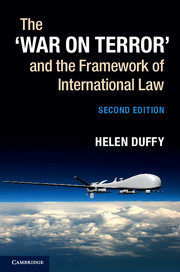Book contents
- Frontmatter
- Dedication
- Contents
- Preface to the second edition
- Preface to first edition
- Select table of cases
- Select table of treaties
- Select Table of resolutions, reports and other sources
- Select list of abbreviations and acronyms
- 1 Introduction
- Part I Terrorism and responsibility
- 2 ‘Terrorism’ in international law
- 3 International responsibility, terrorism and counter-terrorism
- Part II Responding to terrorism: legal framework and practice
- Part III Case Studies
- Select bibliography
- Index
- References
2 - ‘Terrorism’ in international law
Published online by Cambridge University Press: 05 April 2015
- Frontmatter
- Dedication
- Contents
- Preface to the second edition
- Preface to first edition
- Select table of cases
- Select table of treaties
- Select Table of resolutions, reports and other sources
- Select list of abbreviations and acronyms
- 1 Introduction
- Part I Terrorism and responsibility
- 2 ‘Terrorism’ in international law
- 3 International responsibility, terrorism and counter-terrorism
- Part II Responding to terrorism: legal framework and practice
- Part III Case Studies
- Select bibliography
- Index
- References
Summary
Terrorism is a phenomenon to which an inordinate amount of international attention and resources have been dedicated, particularly in the post-9/11 era. The events of 11 September 2001 themselves were ubiquitously and uncontroversially characterised, and internationally condemned, as acts of ‘international terrorism’. Their wake brought unprecedented unity of purpose on the international level as to the need to prevent, punish and otherwise combat international terrorism. Various subsequent attacks strengthened that resolve. Legally binding measures directed against terrorism ensued, with broad-reaching political and legal effect, including Security Council resolutions that imposed a wide range of obligations on states to prevent and suppress terrorism and ensure that ‘terrorist acts are established as serious criminal offences in domestic laws and regulations and that the punishment duly reflects the seriousness of such terrorist acts’. Around the globe, laws have been rewritten, policies changed, ‘exceptional’ measures imposed, and an enormous (and some say excessive) international counter-terrorist effort brought to bear on the suppression and prevention of international terrorism.
One could be forgiven for assuming that international terrorism is a readily accessible legal concept. But is the universal condemnation of terrorism matched by a universal understanding of what we mean by the term? Are the obligations to suppress and punish terrorism matched by an internationally accepted definition of what precisely it is that is to be penalised? In 2001, when questioned on the definition of terrorism, then UK Permanent Representative to the UN, Sir Jeremy Greenstock, suggested that ‘What looks, smells, and kills like terrorism is terrorism’. If so, to paraphrase the famous dictum of a US judge that drives in the same direction, do we simply know terrorism when we see it, and is that a sufficient legal basis to give rise to obligations of states and criminal responsibility of individuals?
- Type
- Chapter
- Information
- Publisher: Cambridge University PressPrint publication year: 2015



